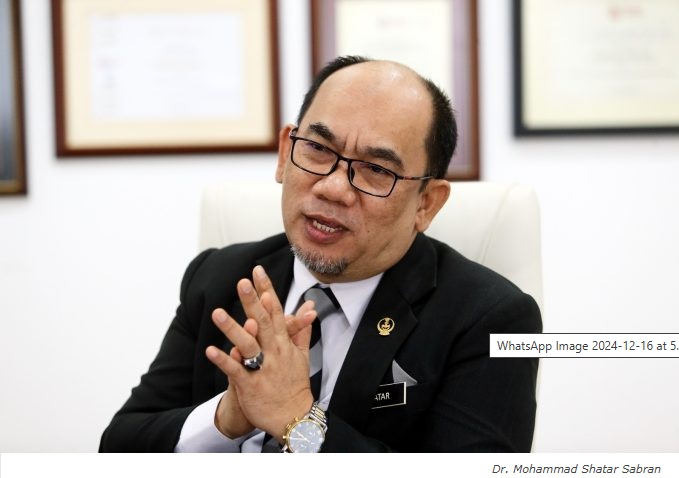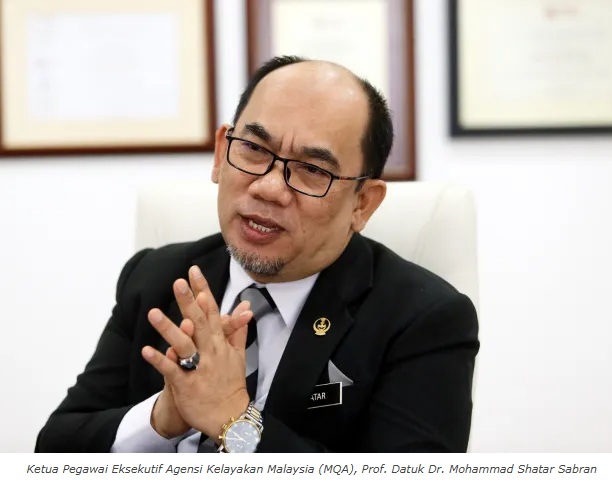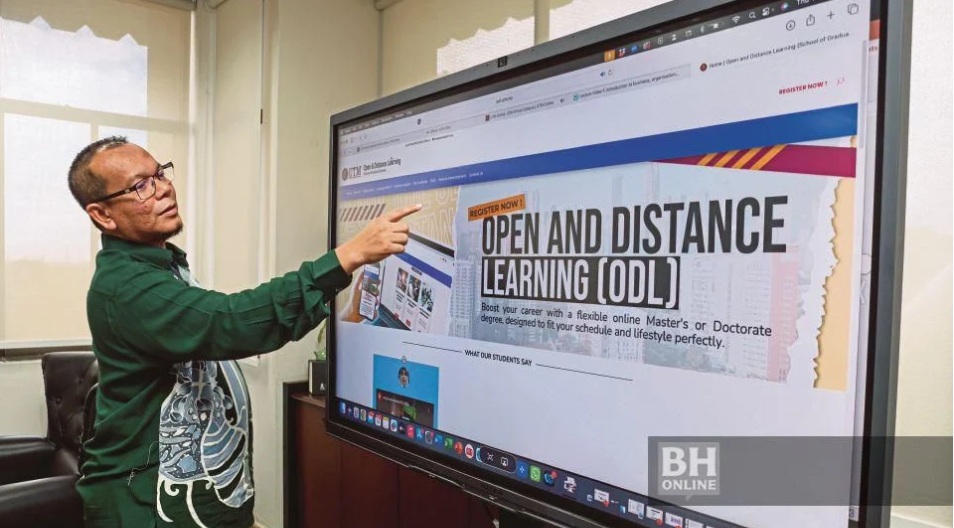 |
||
|
Kebelakangan ini semakin ramai golongan akademik memperoleh ijazah Doktor Falsafah (PhD) dari universiti sama ada di dalam atau luar negara. Ada golongan akademik mendapat PhD dari universiti terkemuka yang diiktiraf, tetapi ada juga memperolehnya dari universiti kurang tersohor atau tidak dikenali. Akan tetapi, sebilangan ahli akademik ini tidak menonjolkan kewibawaan mereka dalam aspek keilmuan dan kepakaran diperolehnya sehingga boleh dipertikai kemampuannya, sekali gus menimbulkan persoalan dari universiti mana orang ini mendapat PhD atau gelaran profesor. Dalam dunia moden hari ini, ketika banyak pihak taasub mengejar pangkat dan gelaran, akan wujud pelbagai tawaran perlu ditapis dengan lebih berhati-hati supaya apa yang 'dikejar' itu sah dan pemegang ijazah PhD tidak tertipu atau menjadi mangsa 'scammer'. Paling penting, apabila menerima gelaran tertinggi dalam akademik, tidak seharusnya pemiliknya memalukan diri sendiri dalam kalangan golongan akademik yang turut mempunyai pangkat dan gelaran sama. Jika ada ilmuwan mahu mendapat PhD dan menggunakan singkatan 'Dr' pada namanya, maka cara terhormat untuk memperolehnya adalah dengan mendaftar sebagai calon di universiti diiktiraf dan bukannya membuat pengajian dengan universiti dilabel 'kilang ijazah' (degree mill) atau 'institusi satu malam' (fly by night institutions). Pengajian peringkat PhD boleh dilakukan melalui kaedah penyelidikan tesis sepenuh masa seperti di United Kingdom (UK) pada atau sebelum 1990-an atau melalui kerja kursus dan kemudian melengkapkan disertasi bagi memenuhi sebahagian keperluannya seperti diamalkan di kebanyakan universiti di Amerika Syarikat (AS) dan Kanada. Kedua-dua kaedah ini memiliki kelebihan tersendiri. Model UK memberi peluang kepada calon menjalankan penyelidikan mendalam bagi sesuatu tajuk khusus. Model ini menganggap calon masuk ke pengajian sebagai pakar dan penyelidikan itu memberi pengkhususan mendalam dalam aspek kepakaran mahu diikuti dengan lebih lanjut. Model benua AS dan Kanada pula menyediakan calon sebagai tenaga pengajar dengan memberi latihan meluas melalui pengajian pedagogi dalam suatu bidang dipilih seperti psikologi, politik, antropologi, sosiologi atau ekonomi. Penyediaan tesis di penghujung kerja kursus adalah latihan singkat untuk melaksanakan pedagogi sudah diikuti. Calon mengikuti program PhD melalui mod tesis sepenuhnya lazim melalui langkah berikut, pertama, perlu lulus cadangan atau pemeriksaan komprehensif sebelum dibenarkan meneruskan penyelidikan ke peringkat kutipan data dan penulisan laporan akhir. Kedua, perlu lulus pemeriksaan tesis bertulis sebelum dipanggil pemeriksaan lisan atau 'viva voce' dan ketiga, pemeriksaan lisan adalah sebahagian daripada pemeriksaan wajib khasnya bagi setiap tesis diluluskan. Viva voce adalah peluang kepada calon menunjukkan kepakarannya kepada penilai dan pemeriksaan ini adalah medan pemeriksa menguji keaslian tesis calon, kemampuan calon mempertahankan kerjanya, dan kebolehan calon meletakkan kajian dan dapatan kajian itu menjangkaui ilmu di bilik kuliah atau makmal.
|
||
| Calon kembali tanpa ilmu tambahan | ||
|
Dalam konteks hari ini, banyak pemegang PhD diragui kesahihannya apabila calon mengikuti pengajian mereka melalui jarak jauh di universiti kurang dikenali, tidak diiktiraf badan pengiktirafan profesional dan majoriti universiti berkenaan mempunyai kampus maya dan tidak ada kampus fizikal. Sekalipun ada kampus fizikal, calon mengikuti PhD tidak diwajibkan hadir secara fizikal di kampus sedangkan kehadiran fizikal ini di kebanyakan universiti sahih adalah satu keperluan dinamakan 'kewajipan kehadiran' (residency requirement) yang wajib dipenuhi untuk lulus dan dianugerahkan ijazah. Berdasarkan tinjauan dalam talian, banyak universiti menawarkan pengajian siswazah diragui kesahihannya menggunakan 1) penilaian ke atas pengalaman kerja, mensyaratkan penulisan esei pendek bukan setaraf tesis atau disertasi dan elemen temu duga. Justeru, perbezaan antara calon memperoleh PhD dari universiti diiktiraf adalah calon berkenaan akan kembali dengan ilmu tambahan tetapi di universiti tidak diiktiraf, calon itu kembali tanpa ilmu tambahan. Ini kerana calon di universiti tidak diiktiraf itu dinilai dari sudut apa yang sudah dimiliki pada dirinya dan ijazah dianugerahkan kepada mereka kerana pengalaman sedia ada. Sementara calon di universiti diiktiraf, mereka dinilai ke atas ilmu baharu atau tambahan yang digunakan sebagai kriteria untuk mengiktiraf mereka layak dianugerahkan PhD, sijil muktamad atau tertinggi dalam dunia akademik. Ingin ditekankan di sini tiada kesalahan melanggar mana-mana undang-undang negara atau antarabangsa kerana tiada satu kaedah diwajibkan satu badan mengawal semua pengajian dan pengeluaran sijil, sehingga ke tahap PhD. Kawalan mutu terletak pada tangan dalam kalangan pengurusan universiti, dalam negara dan luar negara. Ini bermakna apabila sijil itu diiktiraf, PhD itu sama taraf dengan sijil dari semua universiti dalam himpunan universiti yang sama-sama mengiktiraf PhD antara satu sama lain. Justeru, kelayakan itu boleh diterima silih berganti di antara mereka bagi tujuan melanjutkan pengajian, memohon jadi kakitangan akademik dan seumpamanya. Dalam persaingan di mana pendidikan menjadi komoditi ekonomi, maka pengajian jarak jauh turut ditawarkan dan kemudian diikuti pendekatan secara maya khususnya ketika negara Perintah Kawalan Pergerakan (PKP) dilaksanakan ketika darurat kesihatan. Semua bentuk pengajian disyaratkan hanya boleh dilakukan secara fizikal atau bersemuka berubah sekelip mata. Ketika PKP dilaksanakan antara Mac 2020 dan Ogos 2021, semua pengajaran dilakukan secara maya. Oleh itu, timbul persoalan apakah perbezaan ijazah diperoleh melalui hadir ke universiti dan ijazah diperoleh melalui jarak jauh. Hakikatnya, PhD atau mendapat gelaran lain seperti profesor misalnya menjadi tidak bermakna sekiranya tuan punya badan gagal dapat menunjukkan pembawaan dirinya sebagai orang berilmu sesuai dengan kelulusan atau kepakaran dimiliki. Ini yang seharusnya direnungi ilmuwan hari ini dan akan datang, apakah taraf PhD atau gelaran diterima itu layak dengan bidang ilmu diteroka dan dipelajari selama ini. |
||
|
Pengarang: Prof. Datuk Dr. Jayum Jawan Penulis adalah Felo Akademi Sains Malaysia
|































